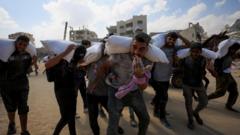**UK and 27 nations call for an end to hostilities, vehemently criticizing Israel's approach to aid distribution amidst reported atrocities.**
**Global Leaders Urge Immediate Ceasefire Amid Humanitarian Crisis in Gaza**

**Global Leaders Urge Immediate Ceasefire Amid Humanitarian Crisis in Gaza**
**International community expresses outrage over the rising toll of civilian casualties in the ongoing conflict.**
In a collective outcry, the UK and 27 other nations have urgently demanded an immediate cessation of warfare in Gaza, decrying the severe toll on civilian lives. In a joint declaration, they condemned the "inhumane killing of civilians", notably children, who are desperately seeking basics like food and water amidst a dire humanitarian crisis.
Reports emerging from Gaza's Hamas-controlled health ministry indicate that Israeli forces killed over 100 Palestinians over the weekend while they were queuing for aid, with many others succumbing to malnutrition. The UK Foreign Secretary, David Lammy, voiced a profound concern, pointing out the ongoing "litany of horrors" affecting the region. He expressed that while supporting Israel's right to security, its current actions "undermine its standing in the world," emphasizing need for urgent humanitarian assistance.
In their statement, the international ministers characterized Israel's model of aid delivery as both perilous and counterproductive—stating that it exacerbates instability and strips away human dignity. "Over 800 Palestinians have died while seeking aid," they noted, calling for an not only cessation of violence but also a reconsideration of how aid is structured in the region.
The United Nations echoed these concerns, with Secretary General António Guterres' spokesperson highlighting the dire state of humanitarian conditions in Gaza and calling for Israel to facilitate unimpeded humanitarian relief efforts. Notably, the UN has documented a tragic number of deaths linked to restricted aid access, urging collaboration to ensure safety and humanitarian principles are upheld.
The newly established Gaza Humanitarian Foundation, devised to facilitate aid delivery, remains controversial. The UN and humanitarian partners have declined to cooperate, labeling it unsafe for the civilians it aims to assist. In contrast, Israel contends that the system protects supplies from being diverted by Hamas.
Compounding the crisis, first-hand accounts paint a distressing picture—reports of families surviving on meager rations while devastating malnutrition rises, particularly among vulnerable populations such as women and children. Humanitarian leaders warn that the situation may prompt mass fatalities if immediate action is not undertaken.
In its latest proposals, Israel has faced backlash over suggestions to consolidate Gaza’s population into designated "humanitarian cities." This approach has been denounced as a violation of international law and deemed unacceptable by the 28 nations backing the joint statement.
As these international leaders stand united against the ongoing conflict, they signal readiness to implement additional measures to push for a permanent ceasefire and a sustainable peace process. However, Israel's government has dismissed these criticisms as misguided, holding Hamas accountable for the perpetuation of violence and the current humanitarian situation.
With casualties mounting—estimates suggest upwards of 59,000 lives lost since the start of hostilities—universal calls for peace resonate through the global community, underscoring the urgent need for collaborative efforts toward resolution and relief.
Reports emerging from Gaza's Hamas-controlled health ministry indicate that Israeli forces killed over 100 Palestinians over the weekend while they were queuing for aid, with many others succumbing to malnutrition. The UK Foreign Secretary, David Lammy, voiced a profound concern, pointing out the ongoing "litany of horrors" affecting the region. He expressed that while supporting Israel's right to security, its current actions "undermine its standing in the world," emphasizing need for urgent humanitarian assistance.
In their statement, the international ministers characterized Israel's model of aid delivery as both perilous and counterproductive—stating that it exacerbates instability and strips away human dignity. "Over 800 Palestinians have died while seeking aid," they noted, calling for an not only cessation of violence but also a reconsideration of how aid is structured in the region.
The United Nations echoed these concerns, with Secretary General António Guterres' spokesperson highlighting the dire state of humanitarian conditions in Gaza and calling for Israel to facilitate unimpeded humanitarian relief efforts. Notably, the UN has documented a tragic number of deaths linked to restricted aid access, urging collaboration to ensure safety and humanitarian principles are upheld.
The newly established Gaza Humanitarian Foundation, devised to facilitate aid delivery, remains controversial. The UN and humanitarian partners have declined to cooperate, labeling it unsafe for the civilians it aims to assist. In contrast, Israel contends that the system protects supplies from being diverted by Hamas.
Compounding the crisis, first-hand accounts paint a distressing picture—reports of families surviving on meager rations while devastating malnutrition rises, particularly among vulnerable populations such as women and children. Humanitarian leaders warn that the situation may prompt mass fatalities if immediate action is not undertaken.
In its latest proposals, Israel has faced backlash over suggestions to consolidate Gaza’s population into designated "humanitarian cities." This approach has been denounced as a violation of international law and deemed unacceptable by the 28 nations backing the joint statement.
As these international leaders stand united against the ongoing conflict, they signal readiness to implement additional measures to push for a permanent ceasefire and a sustainable peace process. However, Israel's government has dismissed these criticisms as misguided, holding Hamas accountable for the perpetuation of violence and the current humanitarian situation.
With casualties mounting—estimates suggest upwards of 59,000 lives lost since the start of hostilities—universal calls for peace resonate through the global community, underscoring the urgent need for collaborative efforts toward resolution and relief.





















